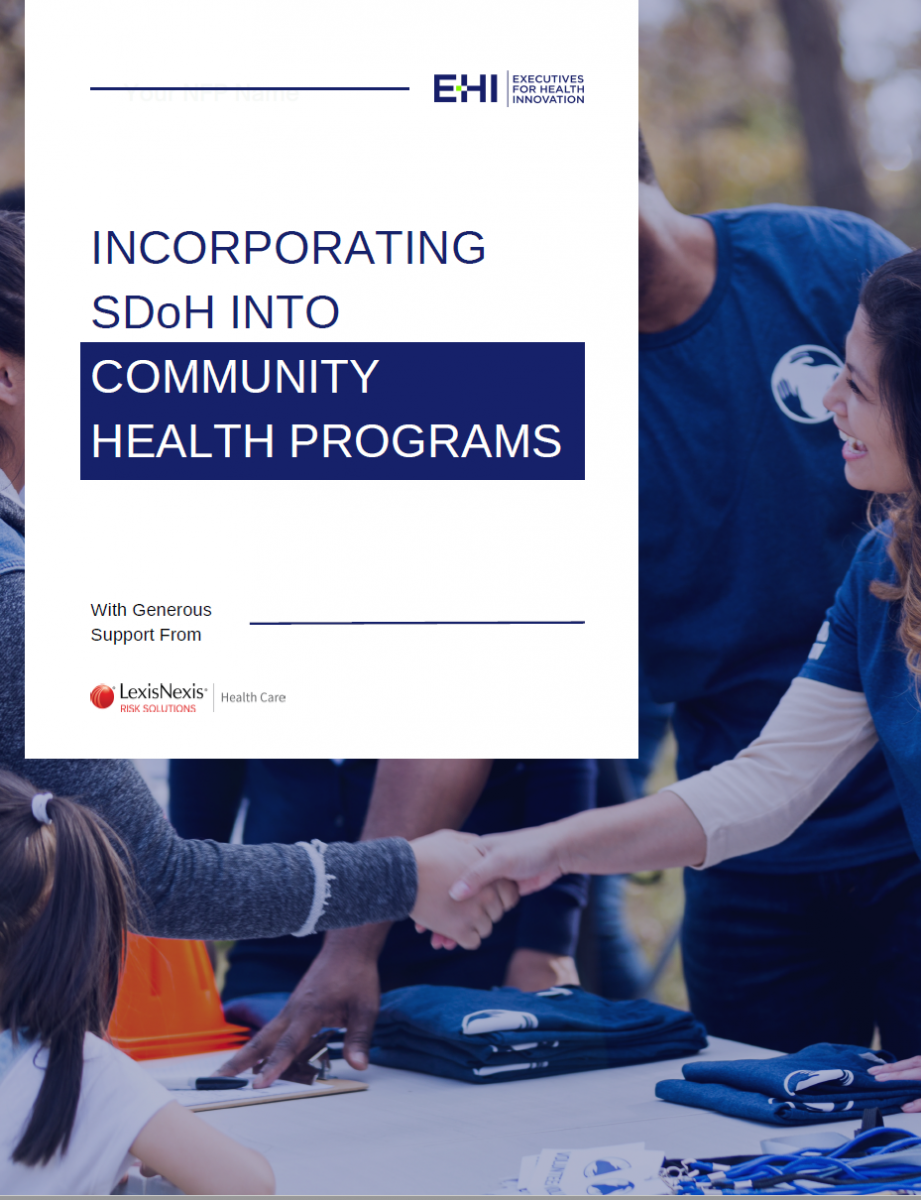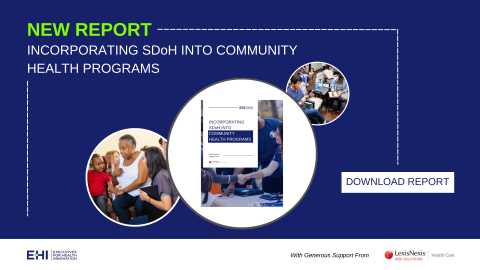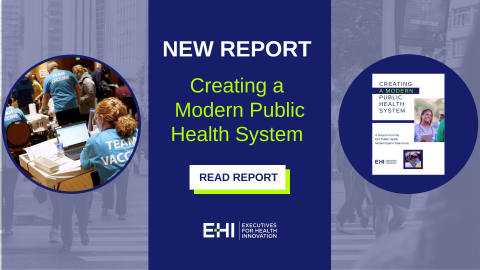EHI and LexisNexis® Risk Solutions Release Report on Incorporating SDoH Into Community Health Programs
Washington, DC – March 16, 2023 – Today, Executives for Health Innovation (EHI) and LexisNexis® Risk Solutions released the report, Incorporating SDoH Into Community Health Programs. This report provides an expert overview of the important elements of incorporating social determinants of health (SDoH) into a Community Health Program (CHP) strategy – to provide interventions for vulnerable populations.
Report: Incorporating SDoH Into Community Health Programs
Overview
|
Over the last decade, researchers have identified how social determinants of health (SDoH) impact vulnerable communities. Social determinants of health (SDoH) are the nonmedical factors that influence health outcomes. It’s generally agreed that SDoH factors can be broken into five categories: education access, quality healthcare, strong neighborhood and built-environment, economic stability, and social and community context. SDoH data provides an additional layer of valuable information to help clinicians and public health experts better understand their populations. Community Health Programs (CHPs) are continuing to incorporate elements of SDoH into their work serving patients. Recently, Executives for Health Innovation (EHI) spoke with experts in SDoH and Community Health Programs to explore the use of SDoH in CHPs. This paper provides an overview of the important elements of incorporating SDoH into a community health strategy. EHI thanks LexisNexis® Risk Solutions for their generous support of this report and their continued support of our organization’s work in realizing a society where everyone has a fair and just opportunity to be as healthy as possible.
|
|
EHI and Philips Release Report on Inequity in Cancer Care
Washington, DC – December 13, 2022 - Today, Executives for Health Innovation (EHI) and Philips released the report, Addressing Inequity in Cancer Care.
How to Get the Most Out of Multi-Stakeholder Initiatives
Learn How to Get The Most From Multi-Stakeholder Initiatives in Healthcare
Multi-Stakeholder Initiatives (MSIs) work in virtually every business and social sector to achieve such far-reaching goals as igniting and driving innovation, broadening markets and improving their performance, diminishing socioeconomic disparities and furthering equity, and advancing information sharing and interoperability.
Report: Creating a Modern Public Health System
In early 2022, Executives for Health Innovation (EHI) formed a Public Health Modernization Task Force in which EHI members with public health expertise came together to form policy recommendations to help build and sustain a modern public health system.
|
Report Overview While there are many problems with the current system to be explored, the Task Force report focuses on areas related to technology and data, given EHI’s focus on digital health and innovation. Through this lens, we focused on two main problem areas that help define the needed changes: fragmented and outdated systems. |
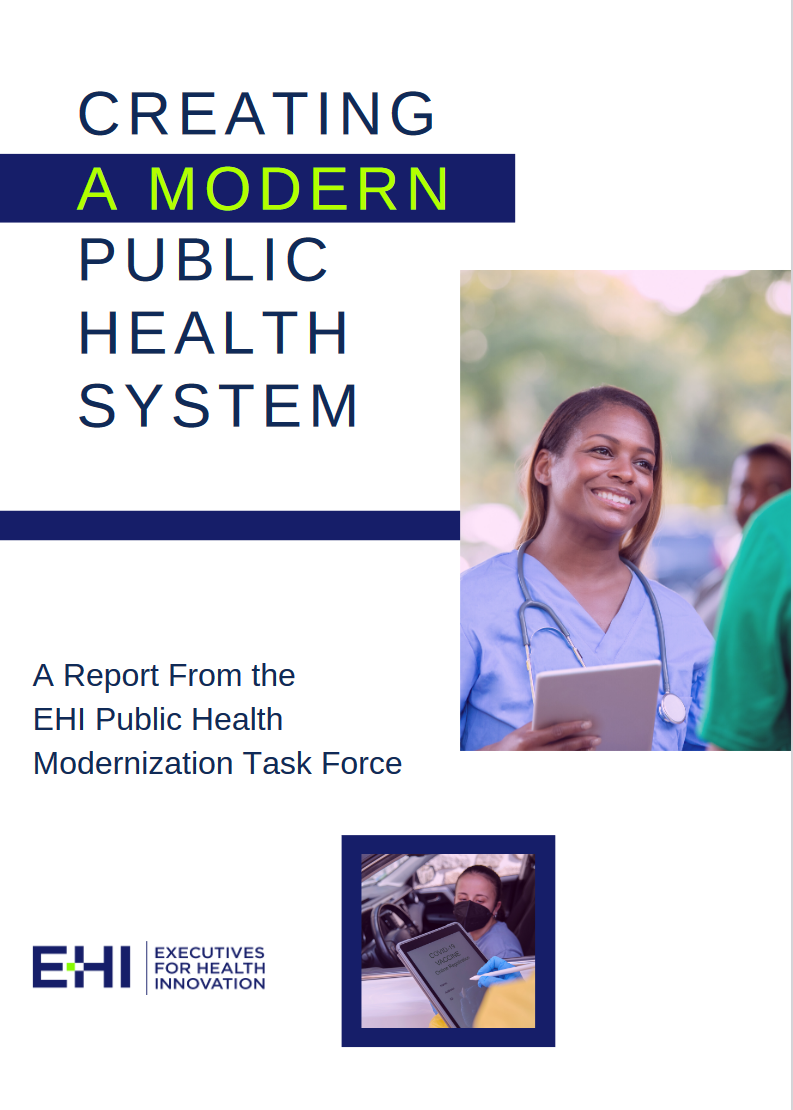 |
Comment Letter: 2023 – 2026 National Health Security Strategy RFI
The healthcare and public health sector is considered a critical infrastructure sector. As such, it is essential that the industry maintain robust cybersecurity protections. While the majority of the industry is privately owned, the federal government plays an integral part in the cybersecurity efforts by coordinating efforts across industry partners, such as with the National Health Security Strategy.
Please see the letter below for EHI’s responses to the specific questions in the request for information (RFI) to help shape the 2023 – 2026 National Health Security Strategy.
Report: The Case for Accountability: Protecting Health Data Outside the Healthcare System
|
Overview With the explosive proliferation of digital technologies, an ever-increasing amount of health data is generated by consumers themselves. This data is both held and used by companies that are not bound by the obligations of HIPAA, leaving that data largely under-protected and under-regulated. With the generous support of the Robert Wood Johnson Foundation (RWJF), the Executives for Health Innovation (EHI, formerly the eHealth Initiative) and the Center for Democracy & Technology (CDT) released the Consumer Privacy Framework for Health Data (the Framework) in February of 2021. The Framework outlines the current gaps in legal protections and discusses how non-HIPAA-covered health data should be used, accessed, and disclosed. A second round of funding from RWJF led to the development of two follow-up reports, The Case for Accountability: Protecting Health Data Outside the Healthcare System, authored by EHI, and Placing Equity at the Center of Health Care & Technology, authored by CDT. |
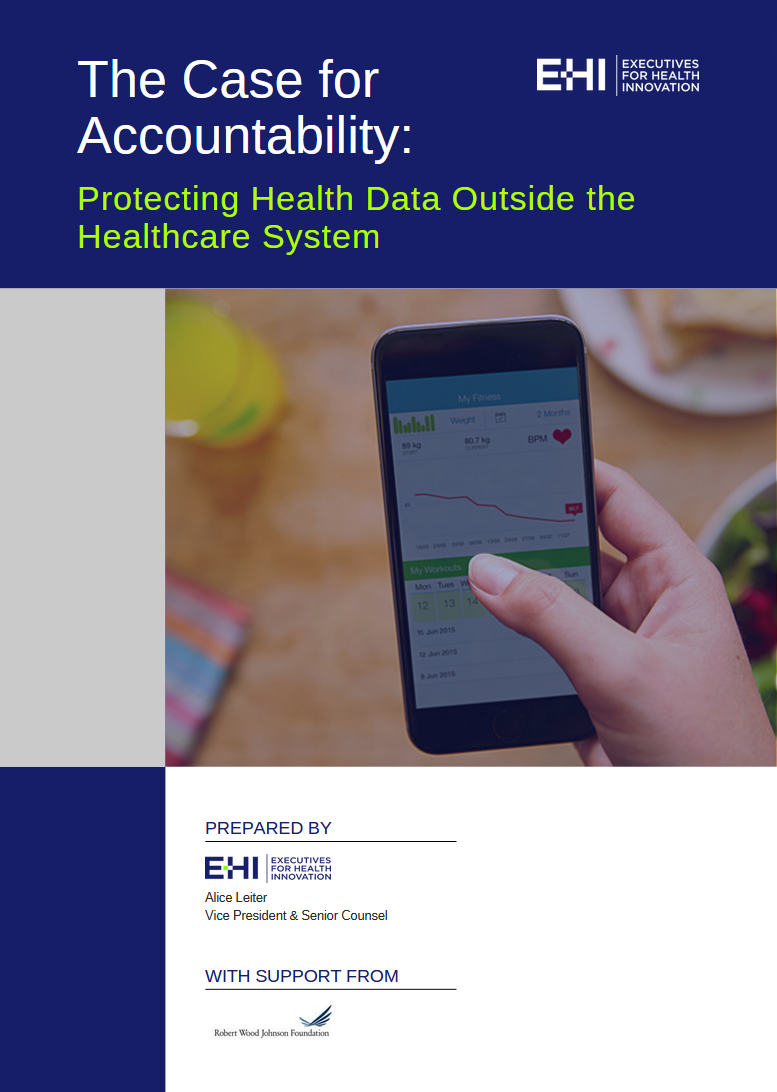 |
The Final Report
EHI’s report makes the case for why a robust accountability mechanism is needed to govern the use of health data held and used by health tech companies. In the absence of new federal data privacy legislation, EHI has put forward a private-sector solution – a neutral, independently run self-regulatory program that will oversee the data use policies and procedures of Framework members.
Self-Regulatory Program
In January 2022, EHI launched a Request for Proposals from organizations interested in housing and running the Framework’s self-regulatory program. After careful consideration of the proposals submitted by an independent, objective committee of experts, EHI is delighted to announce that it has selected BBB National Programs to implement and house this new program, overseeing compliance with the Framework and protecting consumer health data not bound by the obligations of HIPAA.
EHI Announces RFP to Launch Program Recommended in Consumer Privacy Framework
Washington, DC – January 24, 2022 - Executives for Health Innovation (EHI) is coordinating the selection of an organization to implement a key recommendation proposed in the Consumer Privacy Framework for Health Data. The identified organization will implement and house a self-regulatory program to govern compliance with the consumer health data-use standards contained within the Framework.
eHI Releases Policy Principles & Priorities
1) A modern value-based, technology-enabled health care system creates better health care outcomes for everyone. eHI supports a value-based health care system that enables providers to deliver individualized care when and where patients need it, improve outcomes, and lower costs.
Virtual Care & Remote Patient Monitoring
- Permanently remove Medicare telehealth reimbursement restriction
- Promote cross-state provider license portability
- Remove barriers to the on-going utilization of remote patient monitoring devices
2) Digital health tools can be powerful tools to identify and address health disparities and promote health literacy. A variety of social and systemic factors have the potential to impact overall and individual health status. Health care providers and organizations should have access and effectively use digital health tools to identify and work to mitigate factors that lead to health disparities. Public policy must focus on addressing systemic causes of health inequity and allow health care providers to fully leverage digital health tools to combat individual health disparities faced by their patients. Policies should also seek to ensure these tools do not exacerbate existing biases. Additionally, policy should promote equity in access to digital health tools for both providers and patients and focus on ensuring that the design and implementation of digital health enables all levels of digital and health information literacy to benefit.
Broadband
- Support & expand FCC COVID-19 Telehealth Program
- Support high-speed broadband infrastructure funding
Digital health literacy
- Establish funding for digital health literacy programs through FQHCs/RHCs/CHCs
Data collection & exchange
- Support the development and adoption of health IT standards around the collection and exchange of social determinants of health data
3) Patient health information should be easily and securely accessed, exchanged, and shared electronically. eHI supports eliminating the practice of information blocking and allowing for the free and secure access, exchange, and use of health information. In order to advance modern approaches to interoperability, eHI supports the responsible and secure use of standards-based application programming interfaces (APIs) by all applicable stakeholders to enable effective, authorized access to health data by patients, their authorized representatives, providers, payers, researchers, and others authorized to access such data.
Interoperability
- Support implementation and enforcement of information blocking and interoperability rules, as well as continued education for those subject to regulations
- Support secure, standards-based approaches to interoperability and information sharing
4) Patients should be confident that their data is secure and protected – regardless of who controls the data. eHI believes Congress must pass comprehensive data privacy legislation that reflects how data flows in today’s health care ecosystem.
Federal privacy legislation
- Support comprehensive federal data privacy legislation that meaningfully addresses gaps in legal protections for health data outside HIPAA’s coverage
- Advocate that bills related to collection and use of Covid-tracking data emphasize patient education and privacy
Implementation of existing regulations
- Ensure CMS/ONC interoperability rules are implemented in a way that takes burden off of both providers and patients
- Ensure the HIPAA proposed rule is finalized in such a way that increased information sharing doesn’t also result in increased risk of privacy violations
5) Public health systems should be modernized and adequately funded. The COVID-19 pandemic has highlighted the need to modernize current public health surveillance and reporting systems. eHI supports efforts to promote the electronic sharing of public health information and provide predictable and adequate funding to ensure this goal can be accomplished.
Public health modernization
- Monies appropriated for public health system modernization should be used to support ensuring public health systems are interoperable with clinical data sets, allow for the electronic exchange of health information, and improve public health surveillance systems
Public health funding
- Restore and protect funding for the Public Health & Prevention Fund
Bloomberg: Everyone Has a Contact-Tracing App, and Nobody’s Happy About It
Everyone Has a Contact-Tracing App, and Nobody’s Happy About It.
Questions arise over privacy, surveillance—and whether they even work.

